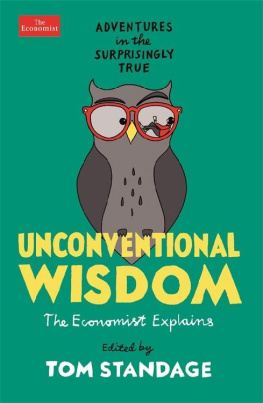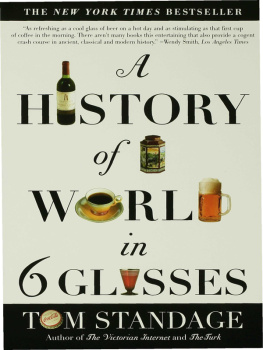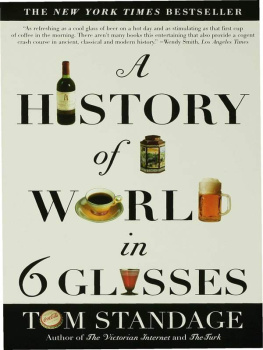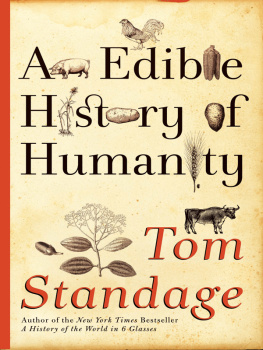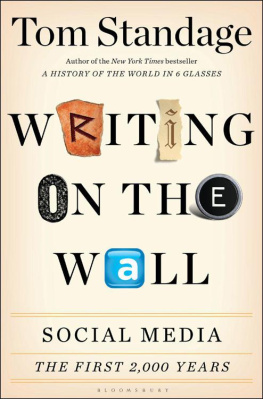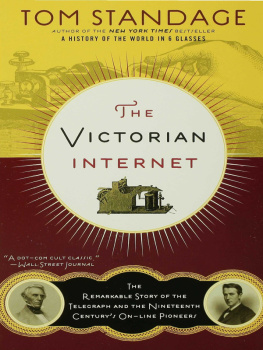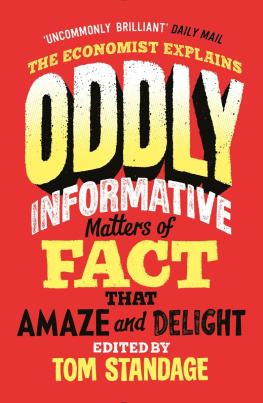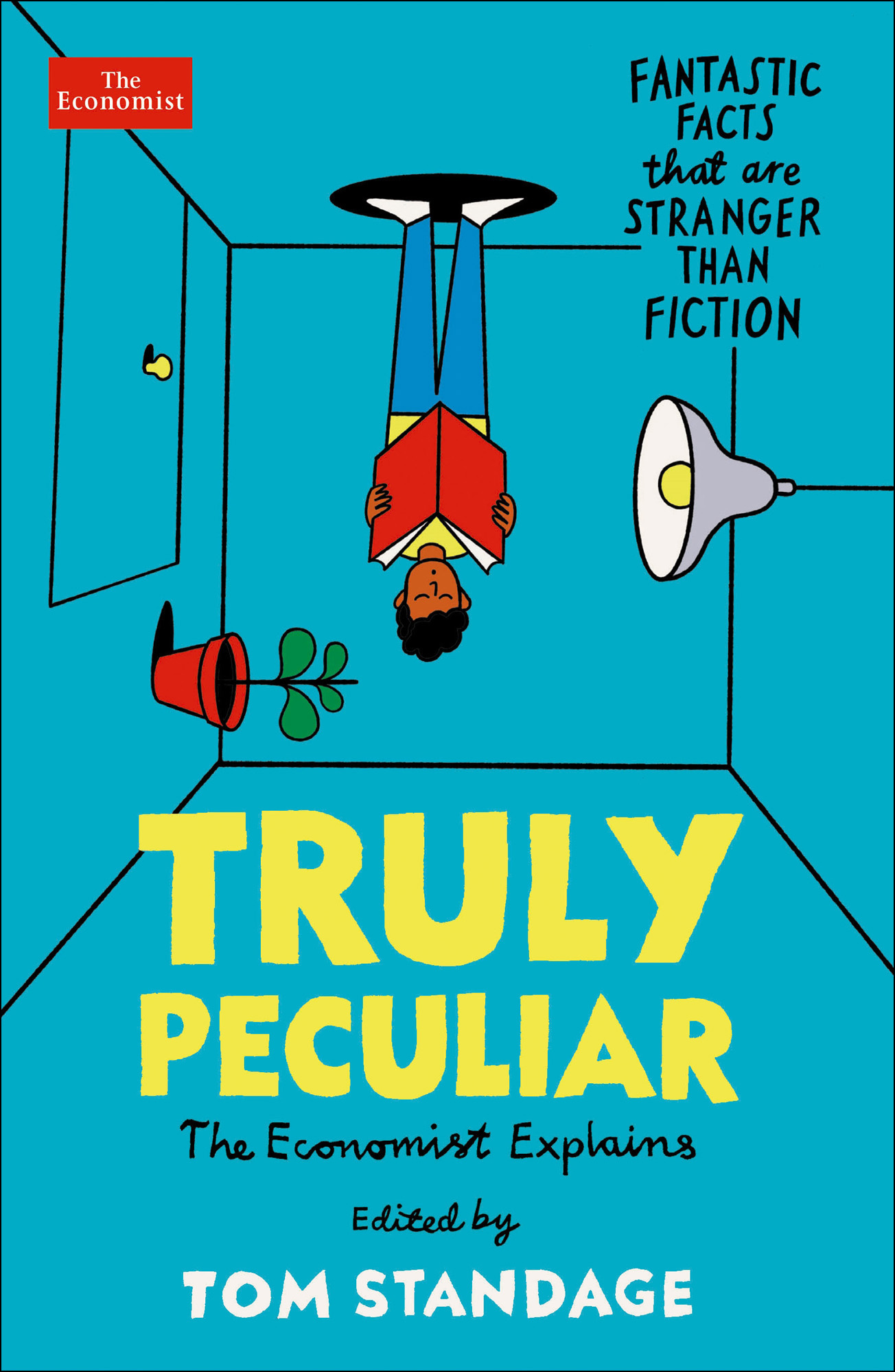TRULY
PECULIAR
TOM STANDAGE is deputy editor of The Economist and the author of seven books, including A History of the World in 6 Glasses. His writing has also appeared in the New York Times, the Daily Telegraph, the Guardian and Wired. Truly Peculiar is the sequel to Go Figure, Seriously Curious, Uncommon Knowledge and Unconventional Wisdom, all of which he edited.

Published in 2021 under exclusive licence from The Economist by
Profile Books Ltd
29 Cloth Fair
London EC1A 7JQ
www.profilebooks.com
Copyright The Economist Newspaper Ltd 2021
All rights reserved. Without limiting the rights under copyright reserved above, no part of this publication may be reproduced, stored in or introduced into a retrieval system, or transmitted, in any form or by any means (electronic, mechanical, photocopying, recording or otherwise), without the prior written permission of both the copyright owner and the publisher of this book.
The greatest care has been taken in compiling this book. However, no responsibility can be accepted by the publishers or compilers for the accuracy of the information presented.
Where opinion is expressed it is that of the author and does not necessarily coincide with the editorial views of The Economist Newspaper.
While every effort has been made to contact copyright-holders of material produced or cited in this book, in the case of those it has not been possible to contact successfully, the author and publishers will be glad to make amendments in further editions.
Typeset in Milo by MacGuru Ltd
Printed and bound in Great Britain by CPI Group (UK) Ltd, Croydon CR0 4YY
A CIP catalogue record for this book is available from the British Library
ISBN 978 1 78816 896 0
EISBN 978 1 78283 893 7
Introduction: in search of the truly peculiar
HERE IS A PECULIAR FACT: the title of this book was suggested by an algorithm. It sounds like something out of a science-fiction story or an avant-garde novel, but it is true. And it seems appropriate for this book, which rounds up fantastic facts and extraordinary explanations that are true, yet are peculiar enough to be stranger than fiction. For example, how can football reduce civil wars? Why are Corsican number plates suddenly so popular in France? And how can Big Macs measure the true size of Chinas economy? And, for that matter, how can a book be named by an algorithm?
Previous books in this series, all of which present collections of explainers and charts from The Economist, have been called Seriously Curious, Uncommon Knowledge and Unconventional Wisdom. Each title is a play on words that combines a word that means facts, factual or factually with a word that means unusual or unusually. There are three distinct combinations: unusual facts, unusually factual and factually unusual. The three preceding titles correspond to one of these combinations: Seriously Curious means something similar to factually unusual, while Uncommon Knowledge and Unconventional Wisdom are both equivalent to unusual facts. Once this underlying formula has been identified, writing a program to generate more titles in a similar vein is a simple matter.
I wrote the program in Python, a popular language that helpfully has a powerful add-on library called Natural Language Toolkit, or NLTK. One of NLTKs features is the ability to generate a list of synonyms of a particular word. Starting with a list of synonyms for unusual, my program expanded it by adding all the synonyms of those synonyms. It then did the same for unusually, facts, factual and factually. It then generated random book titles by picking synonyms from these lists to produce variations on the formulae unusual facts, unusually factual and factually unusual.
Many of the resulting suggestions, it must be said, were not suitable book titles, possibly because the synonyms-of-synonyms approach had the effect of casting the net rather wider than anticipated. That is why you are not holding a book called Disadvantageously Drunk, Oddly Elucidate, Unknown Brainstorm, Extraneous Sapience, Unfeignedly Foreign or Amazingly Honourable. But among the avalanche of awful suggestions were some good ideas: Oddly Informative, Strangely Instructive, Surprisingly Enlightening, Unusually Illuminating, Truly Unusual, Remarkably True and Truly Peculiar. I sent a shortlist of the most promising algorithmic suggestions to the publisher, and Truly Peculiar was the title we chose.
As you can see, the story of how an algorithm came to name this book is slightly technical, but can be explained in a way that is easily grasped by a non-specialist. It highlights something going on in the world today, namely that computers are becoming more capable of manipulating language. Understanding it can give you insight into a field or a topic that you might not be familiar with and may well cause you to raise your eyebrows. It is, in other words, a good example of the kind of truly peculiar explanations you will find more of inside this book. We hope you enjoy reading them.
Tom Standage
Deputy Editor, The Economist
April 2021
Truly peculiar: fantastic facts that are stranger than fiction
How football can reduce civil wars
Could a missed penalty kick really have helped bring peace to Ivory Coast? In 2005 its national football team was on the brink of qualifying for the World Cup for the first time. Having won its final qualifying match, Ivory Coast just needed Cameroon to lose or draw the match it was playing against Egypt. The awarding of a late penalty set the Cameroonians up for a win. But Pierre Wom hit the post. The ball flew wide. Ivory Coast was in.
Listening to the match on the radio, the Ivorian players erupted in cheers. Then they pleaded for peace in their war-torn country. We proved today that all Ivorians can coexist and play together, said Didier Drogba, the captain. The team knelt. We beg you on our knees please lay down your weapons and hold elections, said Mr Drogba. The clip was played again and again on Ivorian television. In the months that followed, the warring parties began talking and, eventually, agreed to a ceasefire. In 2007 they agreed to peace.
There were, of course, factors in play other than Ivory Coasts win, Mr Woms missed shot and Mr Drogbas impassioned plea. But, according to a study published in American Economic Review in 2020, the outcomes of important football matches can have a dramatic effect on national unity and, thus, civil wars.
The studys authors, led by Emilio Depetris-Chauvin of the Pontifical Catholic University of Chile, looked at how Africans identified themselves and how much they said they trusted each other in the days after important national-team matches. They found that people surveyed after their national squad had won were 37% less likely to identify primarily with their ethnic group, and 30% more likely to trust other ethnicities, than those interviewed just before. This is entirely driven by national-team victories, whereas defeats have no discernible impact on that self-identification, the authors noted.
The bigger the match, the bigger the boost to national solidarity and trust. This does not merely reflect a general post-victory euphoria, according to the study. Incumbent politicians and ruling parties got no bounce in approval from a win. Nor was there any impact on respondents optimism about the economy.


